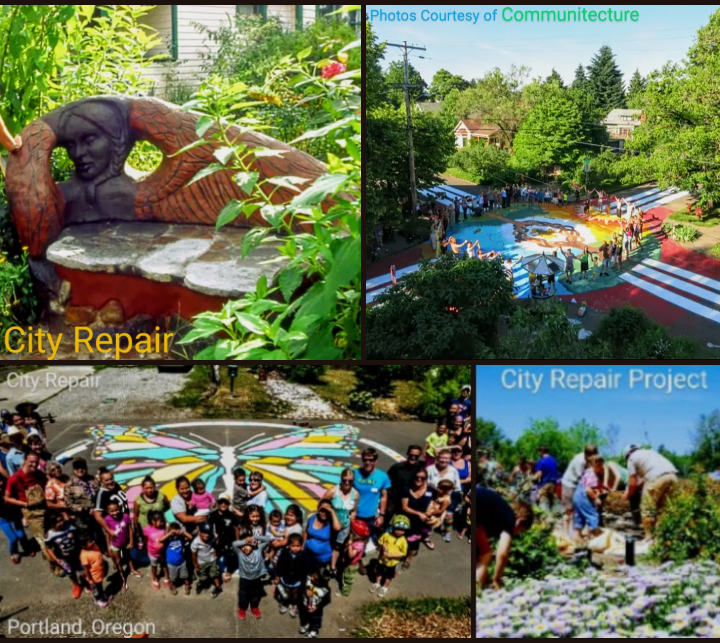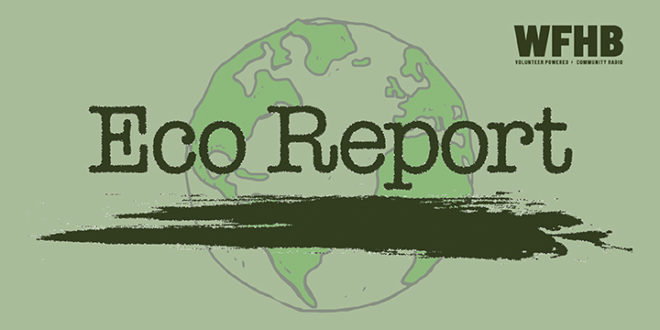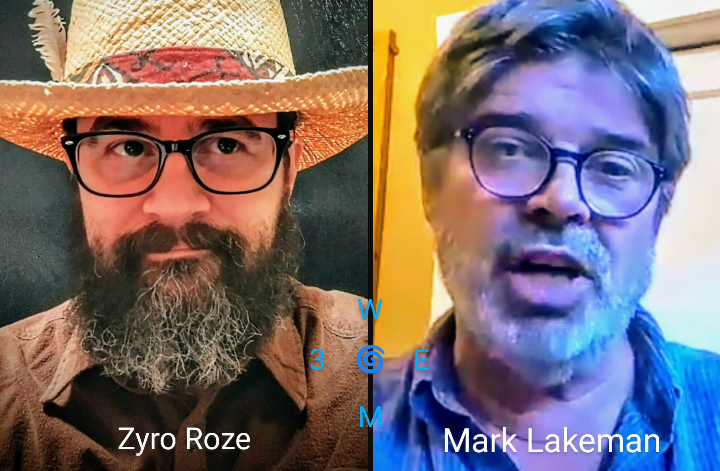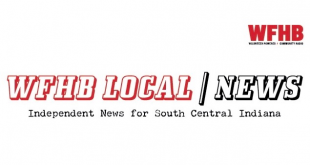Podcast: Play in new window | Download (Duration: 29:32 — 40.6MB)
Subscribe: RSS
| Hello and welcome to Eco Report. For WFHB, I’m Julianna Dailey. And I’m Frank Marshalek. In today’s program, we learn more about restoring social sustainability from eco architect and village builder Mark Lakeman of Planet Repair, inspired by his expeditions into indigenous communities to reconnect isolated Americans by implementing neighborhood place making projects. That’s coming up in Part Four of his conversation with WFHB Environmental Correspondent Zyro Roze. |
|
And now for your environmental reports: The Michigan Senate voted to require that all of the state’s energy come from sources that do not emit climate warming gases by 2040. “This legislation is a major milestone in ongoing efforts to ensure a greener and more environmentally conscious Michigan,” said Sen. Sean McCann (D-Kalamazoo), Chair of the Senate Energy and Environment Committee. “These policies will safeguard public health and better protect our environment now and for future generations, and my colleagues and I will continue to work to address the climate crisis and combating the harmful pollution that plagues our farms, air and Great Lakes.” Senate Bill 271 sets targets for a clean energy future. Those targets include establishing a 100% clean energy standard set to be achieved by 2040, and an 80% clean energy standard by 2035. —Norm Holy |
| The main driver of the extinction of plant and wildlife species around the world is habitat loss. In the U.S. alone, approximately 650 species have become extinct or are “missing in action,” according to the National Wildlife Federation. This week, the U.S. Fish and Wildlife Service (USFWS) removed 21 species from the Endangered Species Act (ESA)’s list of threatened and endangered species due to extinction. Delisting was based on “the best available science” for each species, a press release from USFWS said.
The newly delisted 21 species emphasize the ESA’s importance in trying to protect species before their declines become irreversible. Human activity is the number one driver of species decline and extinction due to habitat loss, overuse, invasive species and diseases. “Federal protection came too late to reverse these species’ decline, and it’s a wake-up call on the importance of conserving imperiled species before it’s too late,” said USFWS Director Martha Williams in the USFWS press release. As the world population and temperatures rise, the pace of extinctions will increase. So far, attempts to halt climate change have fallen way short. By 2100, we may be losing 1,000 species per year. E. O. Wilson, the dean of American biologists, predicted the current mass extinction would cause 1 million plants and animals to go extinct. —Norm Holy |
| A group of residents in Tippecanoe-Warren-Boone-Clinton and Montgomery Counties in Indiana have banded together regarding a plan by the Indiana Economic Development Committee (IEDC) to push piping up to 100 million gallons of water PER DAY from the Teays Aquifer in Tippecanoe County to their upcoming Limitless Exploration Advanced Pace (LEAP) industrial district in Lebanon, Indiana, with plans to use and forward the water to Indianapolis. The IEDC is a government-funded private entity.
The plan, which included Governor Holcomb, has not had a single environmental impact study completed. At a meeting on September 28th, the IEDC’s contracted hydologist presented data from only four days of testing during the wettest part of the year. Residents reported sulfurous water, gravel in their wells, and problems with their filters. No study was done regarding the flora and fauna that might be dependent on the aquifer. The “water grab” will have negative effects on both residents of Indiana and Illinois and their natural resources. At this time, there is no water protection laws in place in the State of Indiana. Members of the group are asking others in Indiana to reach out to the IN DNR and the EPA for more testing. —Julianna Dailey |
| Now that the Arctic Ocean is navigable during the summer months, how much traffic is there? The majority of ships (41 percent) entering the Arctic are commercial fishing vessels. Other types of ships that commonly navigate in the region include bulk carriers, icebreakers, and research vessels. Growing Arctic marine tourism also has its share – 73 cruise ships sailed in Arctic waters in 2019.
Arctic coastal communities that are used to largely un-trafficked waters are likely to experience major changes as shipping in the Arctic increases. As shipping increases, it may interfere with communities’ subsistence harvesting of fish and marine mammals, foul their coastlines if they spill fuel or other toxic substances or impose a heavy burden upon their limited search and rescue and response capabilities in the event of an accident. There is an urgent need to protect the Arctic. As cold-water fish (e.g., cod) move out of the Gulf of Maine , it is critical that sanctuaries are in place to receive them. Given that global warming will be with us for centuries, cold-water species will need the Arctic. —Norm Holy |
| The New York Times reports that as winter is over in the Southern Hemisphere and sea ice around Antarctica has likely grown as much as it’s going to for 2023, according to the National Snow and Ice Data Center. Antarctic sea ice reached its lowest peak by a wide margin for any year since 1979, when the continuous satellite record began.
“The ice this year is so far out of the range of all the other years that it’s a really exceptional year,” said Ariaan Purich, a climate scientist at Monash University in Australia. Antarctica has ice both on land and a massive continental ice sheet. The icebergs that calve off from the big glaciers help to protect the main mass from melting. Less sea ice could mean that the continental ice sheet melts and breaks faster, contributing to faster sea-level rise around the world. That sea ice supports a whole ecosystem of wildlife, including both Adélie and emperor penguins. Last year, several emperor penguin colonies suffered a widespread loss of their chicks when the ice broke up early. What will happen during the coming summer to the so-called ‘Doomsday’ glacier – an Antarctic glacier that buffers warming seas from the large Antarctic ice sheet – could melt much faster than predicted. Officially called the Thwaites Glacier, it is monitored closely by researchers. When it breaks free, it could be catastrophic for the planet. Should the Thwaites Glacier and its surrounding ice basins melt, it could raise sea levels by anywhere between three and 10 feet. This, combined with the Florida-sized glacier’s buffering role in the ocean, has given it its apocalyptic Doomsday nickname. There is nothing we can do at this point to prevent Thwaites from breaking free – it’s too late. It may not break free this summer, but the outcome is certain. —Norm Holy |

And now we turn to Zyro Roze as he explores the origins of the first Little Free Library and the self-service solar powered tea station that formed the initial components of the revolutionary socio-cultural movement that became Portland’s City Repair Project which is now branching out into communities all across the country.
|
| For Eco Report, I am Julianna Dailey. And, I am Frank Marshalek. Are you looking for a way to make a difference on environmental issues? Here at Eco Report we are currently looking for reporters, engineers, and segment producers. Our goal is to report facts on how we’re all affected by global climate disruption and the ongoing assaults on our air, land and water.
We also celebrate ecologists, tree huggers, soil builders and an assortment of champions who actively protect and restore our natural world, particularly those who are active in south central Indiana. All levels of experience and all ages are welcome, and we provide the training you’ll need. WFHB also offers internships. To volunteer for Eco Report, give us a call at (812) 323-1200, or e-mail us at: [email protected]. |
|
And now for some upcoming events: Take an Introduction to Hydroponics class at the Allison-Jukebox Community Center on Saturday, November 4th, from 5 to 6:30 pm. Learn an alternative way of gardening using water rather than soil. Register at bloomington.IN.gov/parks. |
| There will be a Night Owl Hike at Griffy Lake Nature Preserve on Saturday, November 4th, from 9 to 10:30 pm. A naturalist will accompany you as you learn how to spot and listen for common Indiana owl species. Meet at the boathouse. Register at bloomington.IN.gov/parks. |
| Take the Elkinsville History Tour at Monroe Lake on Wednesday, November 8th, beginning at 1 pm. This will be a driving and walking tour through the “town that was.” Meet at the Story Inn in Story, Indiana. Sign up at bit.ly/elkinsville2023. |
| The Sierra Club Hoosier Chapter will gather at the Hitz-Rhodehamel Nature Preserve near Nashville, Indiana on Thursday, November 9th, from 9 to 11:30 am for a hike through the preserve. |
| Join the naturalist at Spring Mill State Park for an Owl Pellet Dissection Workshop on Saturday, November 11th, from 11 am to Noon. You will dissect an owl pellet and use a chart to help determine what animal the owl ate. Please register at [email protected]. |
| And that wraps up our show for this week. Eco Report is brought to you in part by M-P-I Solar, a Bloomington business specializing in solar hot water, solar electricity and solar hot air systems. M-P-I Solar designs and installs solar power generation systems that encourage independence and individual responsibility. Found locally at 812-334-4003 and on the Web at MPIsolarenergy.com. |
| This week’s headlines were written by Norm Holy and Julianna Dailey. Today’s news feature was produced by Zyro Roze and edited by Noelle Herhusky-Schneider. Julianna Dailey assembled the script which was edited by Zyro Roze. Julianna Dailey compiled our events calendar. Kade Young and Noelle Herhusky-Schneider produced today’s show. Branden Blewett is our engineer. For WFHB, I’m Julianna Dailey. And I am Frank Marshalek. And this is Eco Report. |
 WFHB Bloomington Community Radio
WFHB Bloomington Community Radio



